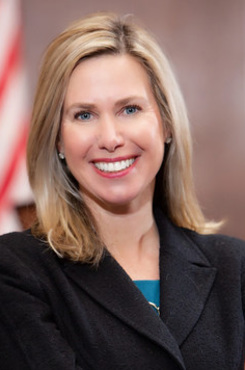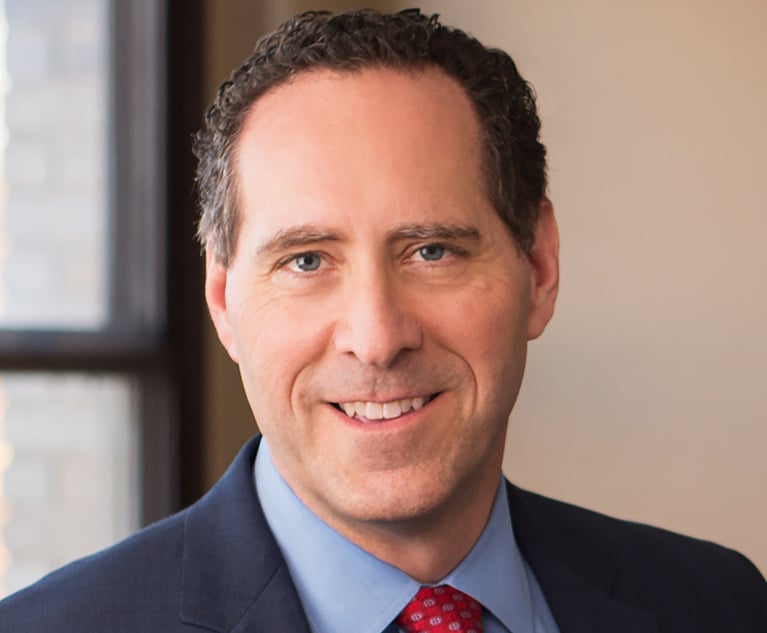Q&A: Pennsylvania Superior Court Hopeful Megan McCarthy King
"Measures should be taken to ensure that cases are heard in an expedient and judicious manner. Justice delayed is justice denied to all parties," King writes.
October 15, 2019 at 12:54 PM
10 minute read
 Megan McCarthy King, Pennsylvania Superior Court judicial candidate. (Courtesy photo)
Megan McCarthy King, Pennsylvania Superior Court judicial candidate. (Courtesy photo)
Pennsylvanians are set to decide Nov. 5 which two candidates will join the ranks of the state Superior Court. To get a better understanding of each candidate's background and judicial philosophy, The Legal has asked each to respond to a questionnaire touching on a variety of topics important to the legal community.
Responses to the questionnaires are set to be published in the weeks leading up to the general election. This installment comes from candidate Megan McCarthy King, Chester County deputy district attorney.
The following has been lightly edited for style.
1. What makes a good judge?
I believe that a good judge is guided by an overriding sense of fairness, respect for the law, and compassion.
2. How would you describe your judicial philosophy?
I view myself as a jurist who strictly applies the laws. A judge's duty is to apply the text of laws to cases—that is the judicial power that our Constitution vests in the courts. I adhere to the philosophy that the Constitution is a fixed document that is meant to be taken literally, and the rules of lawmaking and governance are clearly defined within its context. I believe that a judge's role is to interpret the law as written and to never legislate from the bench.
3. What two decisions or cases are you most proud of and why? Conversely, what two opinions or cases would you like to take back or revise, if you could, and why?
(Two cases of which I am most proud):
a. Commonwealth v. Fleming (No. 3920-2014). The defendant was charged with multiple counts of [involuntary deviate sexual intercourse], incest, aggravated indecent assault of a child, and other related sexual offenses arising from the sexual assault of his daughter from ages 8 to 15 years old. This case involved multiple pretrial matters and the testimony of witnesses with significant prior records. Additionally, the victim's brothers testified for the defense. On the second day of trial, there was a shooting in the courthouse while the victim was testifying on the stand. The victim in this case was very reluctant to testify. I am proud that she trusted me. She still contacts me to share her successes in going to college and attributes my faith in her as a guiding light that she can overcome the trauma and make a significant, positive impact on the lives of others. It was a six-day jury trial with a commonwealth verdict Aug. 31, 2015. Judge Anthony Sarcione of the Chester County Court of Common Pleas presided. Defendant was sentenced to 37 to 86 years.
b. Commonwealth v. Sanchez-Torres (No. 4708-2015). The defendant was charged with IDSI, aggravated indecent assault of a child, sexual abuse of children (possession of child pornography) and other related sexual offenses arising from the sexual assault of his paramour's infant daughter. This case involved technical forensic analysis of social media and the defendant and co-defendant's cellular telephones. Additionally, the co-defendant testified reluctantly and inconsistently. It was a three-day jury trial with a verdict for the commonwealth on Jan. 12, 2017. Judge Phyllis Streitel presided. Defendant was sentenced to 32 to 65 years.
(Two cases that presented specific challenges for me):
c. Commonwealth v. Burn (No. 4704-2016). The defendant was charged with multiple counts of delivery of heroin to his paramour's teenage daughter, conspiracy and endangering the welfare of children. The defendant was injecting his paramour's daughter with heroin. This case brought to light the opioid crisis' impact on children. On Sept. 13, 2017, defendant was convicted on all charges. This case was significant to me because the sentencing guidelines for injecting a child with heroin are three to 12 months. The victim's family was distressed at the sentencing guidelines' range for this crime. I was successful arguing the aggravating factors to the court and on Oct. 13, 2017, the defendant was sentenced to seven to 14 years' imprisonment. I drafted proposed legislation for consideration to the Pennsylvania District Attorneys Association to increase the penalties when drugs are administered to minors.
d. Commonwealth v. Getchius (No. 98-2013). The defendant was charged of multiple counts of rape of a child, IDSI with a child, unlawful contact and other related sexual offenses arising from the sexual assault of a 4-year-old girl. Due to the young age of the child, preparing her for trial was challenging (she often hid under the witness stand and would pop up to repeat her answer to the jury). It was a three-day jury trial with a verdict for the commonwealth on Aug. 26, 2014. Judge James Cullen of the Lancaster County Court of Common Pleas presided. Defendant was sentenced to 23-46 years. This case was difficult for me because the appellate court sent the case back to the Court of Common Pleas for resentencing. It is difficult to tell the victim's family that they still do not have closure, even after the trial is over and a sentence is imposed. Rep. Keith Greiner, R-Lancaster, proposed legislation to make child abusers subject to mandatory minimum sentencing for certain sexual assault offenses committed against our youngest victims.
4. How have your background, personal experiences and views shaped you as a lawyer, or judge?
My well-rounded professional practice and personal experiences have shaped my views as an attorney and have given me the requisite tools to become an effective Superior Court judge.
I currently serve as the deputy district attorney of the Child Abuse Unit in Chester County. I previously served as the supervisor of the Child Abuse and Elder Abuse units in Lancaster County. I have successfully prosecuted homicides, physical and sexual abuse cases, and complex financial schemes targeted against our seniors. In 2018, I was named the Pennsylvania Blue Ribbon Champion for Children, in recognition of my work to bring justice to our most vulnerable victims. I value my responsibilities as a prosecutor, to be a minister of justice and not simply an advocate, to ensure defendants are accorded procedural justice and guilt is decided upon the basis of sufficient evidence and to honor the significant repercussions for victims, defendants and the public.
Not only do I have significant trial experience, but I have appellate and academic experiences. I have written appellate briefs and argued in front of the Pennsylvania Superior and Supreme courts. I have handled civil and criminal matters on appeal when I clerked for Justice Thomas Saylor of the Pennsylvania Supreme Court. And, I have taught education law and special education laws at the graduate school level.
Personally, being married 24 years and raising our three children has also given me perspective. As a mother, it is important to raise children with integrity, kindness and independence to equip them with wisdom to discern for themselves standards and boundaries. It also provides me the foundation of what is most important in life. It is not always easy to bring up children while juggling career, home life, community life and other responsibilities in a world where societal forces test integrity. Children deserve a world that values truth, honesty and justice.
The Pennsylvania Bar Association recommended my candidacy based on my "legal ability, experience, integrity, and judicial temperament."
5. How do you differentiate yourself from others seeking to be elevated to the appellate bench?
My background and experience differentiate me from others seeking to be elected to the Superior Court. As a prosecutor, an educator, and someone with appellate experience, I believe I have the best understanding of the responsibilities of the Superior Court.
6. Does Pennsylvania need a separate court of criminal appeals to divide the massive workload of the Superior Court?
The Superior Court is the people's court and is the busiest intermediate appellate court in Pennsylvania and for most Pennsylvanians, the court of law resort. Measures should be taken to ensure that cases are heard in an expedient and judicious manner. Justice delayed is justice denied to all parties. Public servants have a duty to act with as much efficiency and effectiveness as possible because the funds that are expended in government are not ours, and we must justify each expense. Because I am not a Superior Court judge, I am hesitant to say exactly what should be done to improve judicial administration and efficiency.
Before making recommendations on increasing efficiency, I would have to be in the position and understand how exactly things work.
7. What is the greatest threat to the practice of law or problem the profession faces?
The goal of any justice system should be to create a level of legal fairness throughout society. Judicial activism and politics have begun to unravel the public's confidence in the fairness and impartiality of our system of justice. To improve the public's confidence in the judiciary, they should elect judges that are committed to impartiality, the judicial profession, and justice. I will work to increase the trust and confidence in our judicial system by acting with integrity while treating everyone with highest degree of courtesy and respect. In addition, I will make decisions that are fair and impartial.
8. How important is consensus—particularly unanimous consensus—in appellate court opinions and are there limits when a judge should only concur, or should they do it any time they feel like it?
Clarity in the law that comes from unanimous decisions can be helpful especially if the members of the court work together to craft a broad consensus. However, I would not hesitate to write a dissent if I believed it was an important legal principle that needed to be defended.
9. How important is stare decisis and when should a court depart from it?
The goal of any justice system should be to create a level of legal fairness throughout society. Judicial precedent provides consistency and predictability. It allows for cases to be treated and decided in a manner that is similar to past decisions.
10. Does the court need to become more open and accessible to the press and public?
The court should place first the principles of justice and should evaluate all public outreach on the basis of if it furthers the primary interest of justice. If the court can become more open to the public and maintain its focus on the needs for a fair and impartial outcome that would be ideal.
11.What does your party membership say about you and your legal outlook?
I don't believe partisanship has much to do with my legal philosophy. I believe that a good judge is guided by an overriding sense of fairness, respect for the law, and compassion. The goal of any justice system should be to create a level of legal fairness throughout society.
12.What factors matter in deciding when recusal is necessary, and would you recuse yourself if a campaign contributor were involved in litigation as a party or attorney before you?
It is important that judges are aware of the contributions, and understand when and where they may have to recuse themselves when there exists an appearance of influence/impropriety.
13.Who are your role models and mentors?
My parents are my role models because of the way they lead by example, their selflessness and the way they instilled me with good, solid values. Also, Chief Justice Thomas Saylor of the Pennsylvania Supreme Court. I had the opportunity to clerk for Saylor after working as a prosecutor in Lancaster County. Saylor taught me the importance of following the law, statutes and Constitution as a guide to an eventual decision rather than bending the law to a desired outcome.
More from the Pennsylvania Superior Court Candidates:
Q+A: Amanda Green-Hawkins Q+A: Daniel McCaffery Q+A: Christylee Peck
This content has been archived. It is available through our partners, LexisNexis® and Bloomberg Law.
To view this content, please continue to their sites.
Not a Lexis Subscriber?
Subscribe Now
Not a Bloomberg Law Subscriber?
Subscribe Now
NOT FOR REPRINT
© 2025 ALM Global, LLC, All Rights Reserved. Request academic re-use from www.copyright.com. All other uses, submit a request to [email protected]. For more information visit Asset & Logo Licensing.
You Might Like
View All
Cozen O'Connor's Bernard Nash Pioneered the Modern State AGs Practice. Now He's Hanging Up His Boots
6 minute read
Cohen Seglias Leader Discusses Growing From Construction Practice into Full-Service Law Firm


Trending Stories
Who Got The Work
J. Brugh Lower of Gibbons has entered an appearance for industrial equipment supplier Devco Corporation in a pending trademark infringement lawsuit. The suit, accusing the defendant of selling knock-off Graco products, was filed Dec. 18 in New Jersey District Court by Rivkin Radler on behalf of Graco Inc. and Graco Minnesota. The case, assigned to U.S. District Judge Zahid N. Quraishi, is 3:24-cv-11294, Graco Inc. et al v. Devco Corporation.
Who Got The Work
Rebecca Maller-Stein and Kent A. Yalowitz of Arnold & Porter Kaye Scholer have entered their appearances for Hanaco Venture Capital and its executives, Lior Prosor and David Frankel, in a pending securities lawsuit. The action, filed on Dec. 24 in New York Southern District Court by Zell, Aron & Co. on behalf of Goldeneye Advisors, accuses the defendants of negligently and fraudulently managing the plaintiff's $1 million investment. The case, assigned to U.S. District Judge Vernon S. Broderick, is 1:24-cv-09918, Goldeneye Advisors, LLC v. Hanaco Venture Capital, Ltd. et al.
Who Got The Work
Attorneys from A&O Shearman has stepped in as defense counsel for Toronto-Dominion Bank and other defendants in a pending securities class action. The suit, filed Dec. 11 in New York Southern District Court by Bleichmar Fonti & Auld, accuses the defendants of concealing the bank's 'pervasive' deficiencies in regards to its compliance with the Bank Secrecy Act and the quality of its anti-money laundering controls. The case, assigned to U.S. District Judge Arun Subramanian, is 1:24-cv-09445, Gonzalez v. The Toronto-Dominion Bank et al.
Who Got The Work
Crown Castle International, a Pennsylvania company providing shared communications infrastructure, has turned to Luke D. Wolf of Gordon Rees Scully Mansukhani to fend off a pending breach-of-contract lawsuit. The court action, filed Nov. 25 in Michigan Eastern District Court by Hooper Hathaway PC on behalf of The Town Residences LLC, accuses Crown Castle of failing to transfer approximately $30,000 in utility payments from T-Mobile in breach of a roof-top lease and assignment agreement. The case, assigned to U.S. District Judge Susan K. Declercq, is 2:24-cv-13131, The Town Residences LLC v. T-Mobile US, Inc. et al.
Who Got The Work
Wilfred P. Coronato and Daniel M. Schwartz of McCarter & English have stepped in as defense counsel to Electrolux Home Products Inc. in a pending product liability lawsuit. The court action, filed Nov. 26 in New York Eastern District Court by Poulos Lopiccolo PC and Nagel Rice LLP on behalf of David Stern, alleges that the defendant's refrigerators’ drawers and shelving repeatedly break and fall apart within months after purchase. The case, assigned to U.S. District Judge Joan M. Azrack, is 2:24-cv-08204, Stern v. Electrolux Home Products, Inc.
Featured Firms
Law Offices of Gary Martin Hays & Associates, P.C.
(470) 294-1674
Law Offices of Mark E. Salomone
(857) 444-6468
Smith & Hassler
(713) 739-1250





